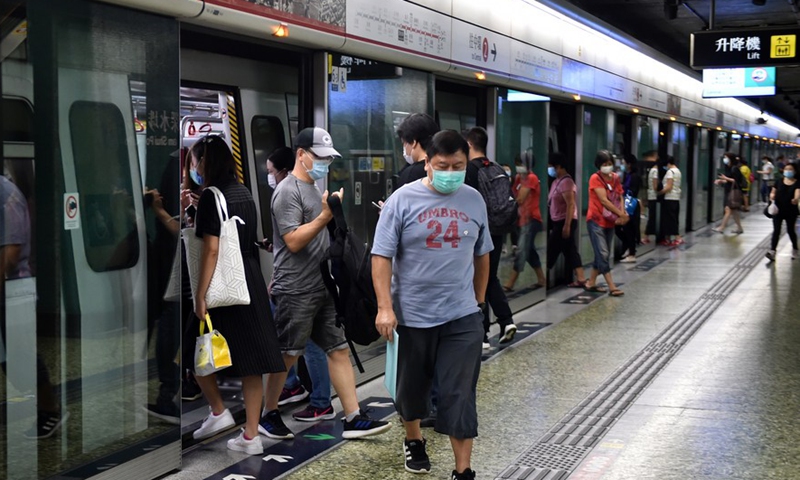Officials, CDC epidemiologist slam smear over central govt's help in HK's fight against COVID-19
By Liu Caiyu Source: Global Times Published: 2020/7/26 14:27:33

Passengers are seen at a subway station in Hong Kong, south China, July 20, 2020.Photo:Xinhua
The Chinese central government will provide anything Hong Kong needs to deal with the COVID-19 pandemic, and one possible way would be helping to build, staff and operate makeshift hospitals to treat patients, experts said Sunday after the city saw more than 100 cases for the fifth consecutive day.
Amid voices smearing aid from the Chinese government, Chief Executive of the Hong Kong Special Administrative Region (HKSAR) Carrie Lam, denounced as "outrageous" any action that tries to damage the relationship between Hong Kong and the central authorities, and spoke highly of the central authorities' latest assistance in retrofitting a makeshift hospital and boosting test capabilities.
Hong Kong reported 128 new cases on Sunday, bringing the total to 2,634.
The HKSAR government on Sunday also announced a halt to crew rotations for all passenger ships and freight ships that do not load or unload goods in Hong Kong starting Wednesday until the epidemic is under control.
Zeng Guang, a chief epidemiologist with the Chinese Center for Disease Control and Prevention, told the Global Times on Sunday that "Hong Kong is part of China. The central government will spare no efforts helping Hong Kong and providing anything the SAR requests in the fight against the virus."
Zeng said "There are opposition voices. But when the epidemic in Hong Kong continues to wreak havoc, politicizing public health problems is not a wise choice."
Amid mistrust and even opposition voices, Zeng said that medical staff from the mainland could staff and manage a makeshift hospital and treat patients there.
Lam said the central government has been very caring about the Hong Kong people, from offering medical supplies at the beginning of the epidemic to helping enhance testing capability and retrofitting the AsiaWorld Expo into a "mobile cabin hospital" upon her recent request.
It is "outrageous" that some people with ulterior motives are smearing and damaging the relationship between the two. They have spread rumors that medical teams from the Chinese mainland will sit in Hong Kong clinics and collect DNA samples from Hong Kong people, Lam said.
Lam made the comments in an article "Fighting the Virus for Six Months Battling Another Wave of the Epidemic Together" on the website of the chief executive's office on Saturday.
He Jing, deputy director of the Liaison Office of the Central People's Government in the HKSAR, said the central government will provide all necessary support in constructing temporary hospitals and improving nucleic acid testing capacity.
Hong Kong microbiologist Yuen Kwok-yung also told the Global Times on Sunday that he supports any move that is good for the HKSAR to control the epidemic. BGI Genomics from the mainland, for example, with its high quality and low fees, is helping to deal with Hong Kong's gap in testing capacity.
Yuen believes that hospitals in Hong Kong have not yet reached their limit. Most patients have mild or no symptoms, and there are only about 30 severely ill patients, meaning the demand for intensive care units is not high. The AsiaWorld Expo will be able to provide 2,000 beds to treat mild cases.
Zeng said that there are multiple ways the central government and mainland can help Hong Kong.
Apart from taking over a makeshift hospital, Zeng listed two other options - patients in Hong Kong could be transferred to mainland hospitals for medical treatment or hospitals in Hong Kong would ask for help on their own if they need medical support.
Some forces claimed that mainland medical teams would be of little use due to language obstacles and different professional standards, but Zeng dismissed such claims, noting the view was politically driven.
Chinese medical teams have been to foreign countries including many in Europe, Asia and Africa. Language and the different medical operation systems have not become an issue, Zeng said.
The epidemic situation is "severe," Matthew Cheung Kin-chung Chief Secretary for Administration of the HKSAR said on Sunday. If the epidemic gets worse, the HKSAR government will not hesitate to adopt more stringent control measures to further restrict business and reduce the space for citizens to go out, Cheung said.
However, at this stage, Cheung said that the government has no intention of introducing a "stay at home order" or a "mobility ban" to restrict citizens from outdoor activities.
"We can still observe for another week before considering more drastic measures. We have not even stopped dining out in eateries in mornings and afternoons," Yuen said. But the situation would be very different if a sudden super spreading event in a number of elder care homes or in a housing estate with a faulty sewage system occurs, Yuen warned.
Posted in: SOCIETY